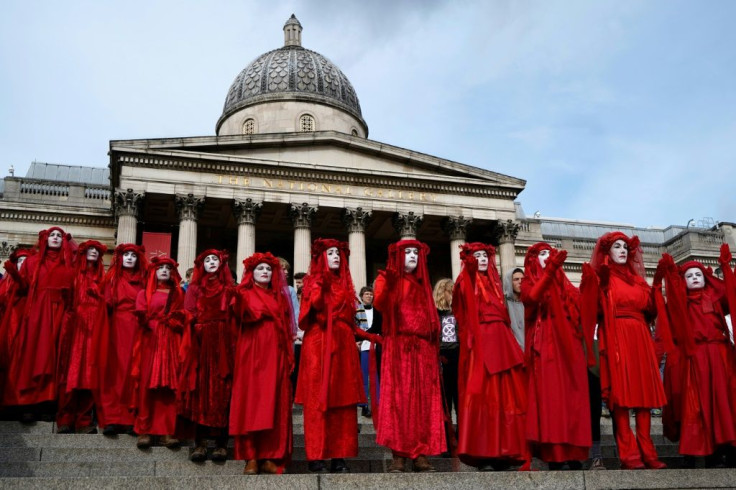Climate Change News: Extinction Rebellion Environmental Activists Forced Out Of London's Trafalgar Square

London authorities on Monday forced Extinction Rebellion protestors to leave their encampment in the busy Trafalgar Square area, as the city has banned demonstrations from the group.
Extinction Rebellion has said that it would "let Trafalgar Square go" while Metropolitan Police Deputy Assistant Commissioner Laurence Taylor has said that "this was an operational policing decision to help us get London moving again."
Protestors continued to demonstrate Tuesday despite the ban, targeting the Department for Transport and the U.K.'s domestic security service, MI5.
.@XRebellionUK are disrupting the @transportgovuk, calling for them to stop funding destructive projects immediately, such as #HS2 & airport expansions & explain their plan to meet net zero emissions inclusive of a zero carbon transport system. @EcocideLawhttps://t.co/3RYZGk1Jjv
— Extinction Rebellion (@ExtinctionR) October 15, 2019
Extinction Rebellion members began protesting Oct.7, with police making over 1,400 arrests and protestors even attempting to shut down London City Airport. The demonstrations were expected to last a full two weeks.
London's ban on the protests has been criticized by human rights organizations and U.K. lawmakers. Amnesty International U.K. has called the blanket ban "chilling and unlawful" and that it is an "unlawful restriction on the rights to freedom of expression and peaceful assembly."
British MP Ellie Chowns was arrested while protesting with the group at Trafalgar. She called the ban "a completely unjustified and disproportionate measure."
Last night I was arrested in Trafalgar Square while defending the right to peaceful public protest. That right is central to a functioning democracy. Yesterday, public protest was banned throughout our capital city. This is a completely unjustified and disproportionate measure.
— Ellie Chowns (@EllieChowns) October 15, 2019
The group was founded in October 2018, using civil disobedience to push the British government to act on climate change. The movement has called for global carbon dioxide emissions to sink to zero by 2025.
Protestors often participate in "die-ins," where hundreds of people fall to the ground in a public place to symbolize the threat climate change poses to humanity.
© Copyright IBTimes 2025. All rights reserved.





















